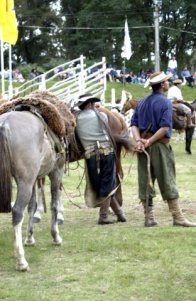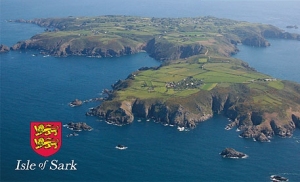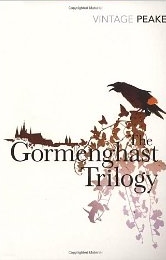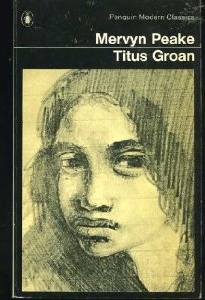The Purple Land, Mervyn Peake and Gormenghast, and The Day We Caught The Train. Audio and Radio Review 20th July 2011
Hunting, riding, herding, loving and killing through the Purple blaze, crumbling stone and ancient ritual, horses with lion tales, people called Sepulchrave, Prunesquallor and Steerpike and the shocking confrontation of your mother’s secret past.
A snapshot of BBC audio drama output at any time offers depth in dramatic literary output, entertainment and sophisticated production aesthetics.
Listening to the Saturday Play ‘The Purple Land’, the first episodes of The Classic Serial’s new dramatisation of Mervyn Peake’s Gormenghast novels, the latest BBC Radio Four Play download of the week, ‘The Day We Caught The Train’ from the Afternoon Play stable, and a half hour documentary ‘A Hundred Years of Mervyn Peake’ I was surprised and intrigued where the respective emphasis of depth, entertainment and aesthetics actually fell.
The more resonant and thoughtful programmes were the shorter ones.
But starting with the Andrew Davies’ adaptation for radio of William Henry
Hudson’s ‘The Purple Land’, first published in 1885, I can say without any intention to provide negative criticism, that there was no literary or philosophical depth in this production.
It was sheer rollicking fun. Radio 4 publicity described it as ‘a fast paced romp.’ Hudson’s reputation relies on his later authorship of ‘Green Mansions.’ This was his first novel and it certainly sounded like one.
I am not sure we heard evidence that he was ‘one of the finest craftsmen of prose in English literature,’ and nor was there anything in what I heard that he was ‘a thinker on ecological matters far ahead of his time,’ though the biographical background was undoubtedly interesting.
No, the storytelling and the literature in ‘The Purple Land’ were very, very thin. The purple paint pigment was so diluted that the colour changed to mauve, lilac or lavender.
But let me say listening to this lavish and lovely production cheered me up no end. It was a miserable Saturday afternoon, nasty, horizontal and very wet rain was spurting about in buckets, the humidity was near drowning level, summer light had been turned into bleak thunderous melancholy.
Yet I lay back and allowed myself to be swathed in a sound orgy of audio-burlesque. David Tennant sounded as though he had the most tremendous fun playing the Victorian roué Richard Lamb. Tennant gives the impression of an extremely hard working actor, taking on every kind of dramatic genre and expressing a wonderful versatility of characterisation.
Clive Brill conjured an audio film in glorious imaginative technicolour.
This was such a skilful sound design and direction that at one point I actually imagined myself with Lamb herding thousands of head of cattle on the South American plains of Uruguay.
The production had multiple layers of quality. Original music was composed and performed by Ross Hughes and Esben Tjalve. The trumpet from Daniel Weitz was exquisite. This was an independent production by Pacificus.
In ‘A Hundred Years of Mervyn Peake’ produced ably by Sara Jane Hall (Thu, 7 Jul 2011, 11:30 on BBC Radio 4), Mervyn Peake’s life and character were narrated and reported by his older son Sebastian Peake who described how his “intense love for my parents, with its resultant anguish, lives on for me”.
This was a charming and moving half hour documentary that conveyed the listener to the atmospheric Isle of Sark where Sebastian and siblings lived with his remarkable artist and author father and mother Maeve Gilmore through the late 1940s.
Sebastian’s evocative revisiting of his childhood with his brother Fabian and sister Clare offered clues to the inspiration for Mervyn’s remarkable imagination.
I found myself thinking about this programme for more than a week after
listening to it and finding a way into Mervyn Peake’s creative writing as dramatised in an overwhelmingly impressive six part Classic Serial dramatisation of all his Titus Groan books.
Despite the context of the one hundred year anniversary of his birth and its representation on BBC Radio Four having promotional economic dimensions for his franchise and estate, Mervyn emerged as a sensitive and creative man struggling to find his way in a brutal, perplexing and catastrophic 20th century.
His first association with Sark was in the 1930s and his son’s return there with the sonic background and imaginative spectacle of description, actuality and interview began to explain the metaphor of the magic realism that is the style of the books that have made his reputation. What were equally interesting were the parallels with his distinctive illustration and style of painting.
Sebastian conjured images of knuckles of rock whipped by the Channel waves, treacherous cliff-cleaving bays concealing mysterious secrets, recorded the sound of old Norman patois, recalled playing and hiding in the bomb shelter built for the German HQ on the Island during its occupation, and teased out the wonderful anecdote of how an aggrieved Sark sailor bopped his father in the face after sneaking a look of how his father had realistically depicted his subject’s red nose enlarged by an excess of absinthe.
Mervyn Peake tried his best to volunteer his services during the Second World War as a war artist but the military insisted in trying to bash a square peg into a round hole. The result was the first nervous breakdown. They would eventually send him to fulfil his destiny as a war artist to the liberated and notorious concentration camp at Belsen and nobody could emerge from the experience of drawing and painting the dead and dying without some cost to the emotional psyche.
Mervyn and his beloved wife Maeve managed to scrape a professional living as artists, and bring up three children on an income that was barely modest. He put all his hopes into a play written for the West End. And what happens so frequently in Britain’s cruel and nasty critical environment, first night reviews panned, crushed and humiliated this sensitive man to the point of an irretrievable physical and mental collapse so hauntingly remembered by his seven year old daughter.
This was an age of primeval and arrogant medical treatment. A lobotomy operation did further damage. The remembrance of Maeve so lovingly and brilliantly helping her husband continue with his writing and then complete unfinished work after his death was deeply moving.
It may well be a great failing on my part, but for some inexplicable reason I have been so resistant to the allure of the magic realism genre of Tolkein, Peake and Rowling.
Yet this documentary made me listen with fascination and concentration to the first two episodes of the Titus Groan stories in another impressive BBC Classic Serial produced by Jeremy Mortimer. The first episode Titus Arrives(Sun 10 Jul 2011 15:00 BBC Radio 4, Sat 16 Jul 2011 21:00 BBC Radio 4) was superbly directed by Gemma Jenkins.
I can’t fault any of the performances heard so far. The casts sounded like they
wanted to put everything they had into the creative playing of quite outstanding adaptation scripts for radio by Brian Sibley.
One of Southport’s finest [apologies as I have family connections with the town] Miranda Richardson, was a really memorable and delightful Gertrude, Countess Of Groan.
Olivia Hallinan’s Fuchsia was so wicked and naughty I wanted to bottle the spirit of it and use it as a future tonic to cheer people up.
Episode Two ‘Titus Inherits’ (Sun 17 Jul 2011 15:00 BBC Radio 4, Sat 23 Jul 2011 21:00 BBC Radio 4) continues to build in quality and power and sends out a message to contemporary writers and the agents managing the estates of iconic authors no longer with us. BBC Radio has the talent, power and resources to create memorable sound representations of the finest writing in any language.
The web pages hosting credits and listen again offer us photographs of the actual audio drama directing and performances in the BBC sound studios. Actors lying flat on their faces, and relating to microphones poised at angles and positions to challenge the imagination.
And anyone frustrated about missing out on listen again because of the proverbial 7 day listen again rights guillotine has a dispensation this time. Not only will each episode’s audio be available after the broadcast on Sunday, it will remain available until 21 August 2011.
But a word of warning. So enthusiastic and passionate as I have been in consuming listen again, I recently received my BT bill that whacked a massive charge for exceeding my gigabytes of downloading. I now have several fm and digital radios strategically programmed to alarm and catch programmes I want to listen to when broadcast as live.
It’s not easy catching Afternoon Plays if you are working during the week; largely because monetarism and postmodernist harassment of the workplace means there is nothing left of what used to be guaranteed as ‘the lunch hour.’
But luckily the BBC selected ‘The Day We Caught the Train’ (Fri 15 Jul 2011 14:15 BBC Radio 4) by Nick Payne as its Radio Four Play download of the week.
This was a truly memorable and quite brilliant script and production. The BBC has gone out of its way to credit people they would not normally mention. Understandably we learned that Sasha Yevtushenko assuredly directed very fine performances from Olivia Colman as Sally, Ralph Ineson as David, Nishi Malde as Anna, John Rowe as Harold, Jane Whittenshaw as Helen, and Simon Bubb as the waiter/porter.
But there was something else going on here that was original and unusual. I suspect it was the ‘point of listening’- a phrase coined and discoursed a few years ago by my former academic colleague and radio drama researcher, Alan Beck.
The production shifted the listening perspective, and therefore the position of the microphones and in the process one felt like an observer moving around the imagined action as though taking different positions on a 360 degree axis in high definition 3-D film.
If that was not the intention and perhaps the result of my mixing coffee with passion fruit first thing in the morning I apologise. But if there was an experimentation going on here, well done to studio managers Caleb Knightley and Keith Graham, editor, Anne Bunting, and production co-ordinators Nicole Fitzpatrick and Matthew Mills.
As for the story in the play:
‘It’s a big day for Sally, and she’s been planning it for weeks. But when her mystery man finally arrives, she’s left hopelessly unprepared.’
There’s a big punch in this plot that then draws out profound emotional truths about identity and human relationships. Nick Payne’s script is a model of how to give entertainment to listeners by asking them to guess and work things out for themselves.
Audio of this review by Tim Crook










Really wonderful visual appeal on this internet site , I’d rate it 10 10. vps hosting | cpanel vps |
vps hosting offshore
August 4, 2011 at 2:22 am
You have a fantastic looking website–hopefully mine will be like it one day. availhosting.com
availhosting review
August 5, 2011 at 9:35 pm
I enjoy your writing style genuinely enjoying this website . unlimited web hosting | shared hosting |
web hosting x
August 7, 2011 at 6:34 am
I read the Gormenghast trilogy when I was only 18 and commuting up to London for work. I am 60 next year and images set in my mind all those years ago are still with me. Mervyn Peakes descriptive writing enabled me to visualise, smell and hear between the lines.To this day I feel as though I have been privvy to a secret world peeked at through a crack in the door. Totally awesome.
Jan McGill
October 27, 2011 at 1:02 pm
I too read the Peake trilogy when I was 18 whilst sick in bed. The incedible images have stayed with me for my whole life, I have looked for the outline of Gormenghast in every place I have ever been, recognised parts of the charecters in people I have met and longed for 42 years to explore that wonderful incredible castle.
keith harland
May 21, 2012 at 7:42 am